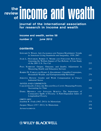
REVIEW OF INCOME AND WEALTH
Scope & Guideline
Innovating Research in Economic Equity and Growth
Introduction
Aims and Scopes
- Income and Wealth Inequality Analysis:
The journal emphasizes research that investigates the causes, consequences, and measurement of income and wealth inequality, particularly through empirical data and methodological innovations. - Poverty Measurement and Dynamics:
It explores the dynamics of poverty, including multidimensional poverty assessments and the intersection of income, wealth, and social factors influencing poverty. - Intergenerational Mobility:
Research on intergenerational mobility is a core focus, examining how wealth and income are transmitted across generations and their implications for social equity. - Economic Policy and Redistribution:
The journal encourages studies that analyze the effectiveness of economic policies and redistribution mechanisms in addressing inequalities and their impacts on societal well-being. - Impact of Economic Shocks:
It also covers the effects of economic shocks, such as the COVID-19 pandemic, on income distribution and wealth dynamics, reflecting on both short-term and long-term implications. - Use of Advanced Methodologies:
The journal promotes the application of innovative methodologies, such as machine learning and econometric modeling, to enhance the analysis of income and wealth data.
Trending and Emerging
- Impact of COVID-19 on Inequality:
Recent publications have increasingly focused on how the COVID-19 pandemic has exacerbated existing inequalities, highlighting the urgent need for research on resilience and recovery strategies. - Use of Machine Learning and Big Data:
There is a rising trend in the application of machine learning and big data analytics to understand and predict patterns of income and wealth dynamics, indicating a shift towards more sophisticated analytical tools. - Intangible Assets and Economic Growth:
Research exploring the role of intangible assets, such as intellectual capital and brand value, in economic growth and inequality is gaining traction, reflecting a broader understanding of wealth beyond physical assets. - Intersectionality in Inequality Studies:
Emerging studies are increasingly addressing the intersectionality of various social categories (e.g., race, gender, and class) in relation to income and wealth disparities, emphasizing a more nuanced approach to understanding inequality. - Regional Inequality and Policy Responses:
There is a growing focus on regional disparities in income and wealth, along with corresponding policy implications, as researchers seek to understand localized effects of broader economic trends.
Declining or Waning
- Historical Inequality Studies:
Research focusing on historical analyses of inequality, such as studies on inequality in pre-industrial societies, has seen a decrease in frequency, possibly due to a shift towards contemporary issues and data-driven insights. - Traditional Economic Growth Models:
There has been a waning interest in traditional economic growth models that do not adequately address inequality, as newer frameworks that incorporate inequality dimensions gain traction. - Sector-Specific Inequality Analyses:
Studies that focus narrowly on specific sectors or industries without broader implications for income and wealth inequality may be less frequently published, as interdisciplinary approaches become more favored. - Single-Dimensional Poverty Measures:
There is a noticeable decline in research centered solely around single-dimensional poverty measures, as the journal increasingly emphasizes multidimensional perspectives.
Similar Journals

Revista Economia
Unlocking the Secrets of Economics for Scholars and PractitionersRevista Economia is a reputable academic journal published by PONTIFICIA UNIV CATOLICA PERU, dedicated to advancing knowledge in the field of economics. With an impact factor that reflects its substantial contribution to economic research, the journal has been an Open Access platform since its inception in 1977, facilitating widespread dissemination of scholarly work. Located in Lima, Peru, and serving a global audience, Revista Economia invites researchers, professionals, and students to explore a diverse range of topics related to economic theory, policy analysis, and applied economics. Its commitment to rigorous peer review ensures the publication of high-quality, impactful research, making it an essential resource for those seeking to deepen their understanding of economic issues and trends. The journal's ISSN (0254-4415) and E-ISSN (2304-4306) provide easy access to its vast repository of articles, further enhancing its stature within the academic community.
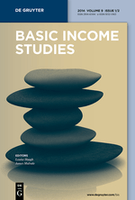
Basic Income Studies
Connecting Theory and Practice in Basic Income StudiesBasic Income Studies, published by Walter de Gruyter GmbH, serves as a vital platform for interdisciplinary dialogue and research in the domain of basic income, exploring its implications across economic, social, and policy-related dimensions. Established in 2006 and reflecting a commitment to innovation in social welfare theory, this journal has carved a niche within the Q3 category of Economics and Econometrics as of 2023, ranked #372 out of 716 journals in its field according to Scopus. With its emphasis on open access scholarship, researchers can disseminate their findings widely, fostering a global discussion among scholars, practitioners, and policymakers. The journal’s comprehensive scope aims to publish cutting-edge research that not only contributes to the academic discourse but also has practical implications for the design and implementation of basic income policies worldwide. Located in Berlin, Germany, Basic Income Studies represents a pivotal resource for anyone engaged in the evolving conversation surrounding economic equity and social justice.

International Journal of Economic Policy Studies
Connecting Economics, Politics, and Society for a Better Tomorrow.The International Journal of Economic Policy Studies is a premier academic journal published by SPRINGERNATURE, dedicated to advancing research in the fields of economics, political science, and sociology. With an ISSN of 2524-4892 and an E-ISSN of 1881-4387, this journal is recognized for its commitment to open access, fostering global dissemination of knowledge while promoting rigorous peer-reviewed scholarship. Based in Japan and operating from CAMPUS, 4 CRINAN ST, LONDON N1 9XW, ENGLAND, it has successfully established itself as a valuable resource for researchers and professionals alike. The journal's impact is reflected in its respectable Q3 status across major categories, including Economics and Econometrics and Political Science, complemented by its Scopus rankings that showcase its significance in the academic community. Spanning the years from 2019 to 2024, the International Journal of Economic Policy Studies serves as an essential platform for critical discussions and innovative policy analysis, making it a must-read for scholars looking to explore contemporary issues and foster informed decision-making.

SOCIAL INDICATORS RESEARCH
Measuring Well-Being, Transforming SocietySOCIAL INDICATORS RESEARCH is a prominent peer-reviewed journal published by SPRINGER, focused on delivering high-quality research within the fields of social sciences, including sociology, political science, and developmental psychology. With a history spanning from 1974 to 2024, this journal has established itself as a vital resource for scholars interested in the multifaceted aspects of social indicators, quality of life, and measurement of subjective well-being. The journal boasts an impressive Q1 quartile ranking in Arts and Humanities, Social Sciences, and Sociology, reflecting its influence and reputation within these domains. Despite operating under a traditional subscription model, it ensures accessibility to a wide audience through its comprehensive studies and findings. The journal continuously aims to bridge the gap between empirical research and practical applications, making it an essential read for researchers, professionals, and students seeking to advance their understanding of social phenomena and indicators.
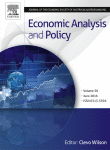
Economic Analysis and Policy
Empowering Economists to Address Today's ChallengesEconomic Analysis and Policy is an esteemed academic journal published by ELSEVIER, dedicated to advancing the field of economics and econometrics since its inception in 1970. Based in the Netherlands, this journal plays a pivotal role in disseminating high-quality research that addresses contemporary economic issues and policy challenges. With an impressive Q1 ranking in both the Economics and Econometrics categories, and recognition in the top 91st percentile of Scopus rankings, it is a leading platform for scholars, professionals, and students seeking to contribute to and engage with the evolution of economic thought. The journal does not currently operate on an open access model, allowing it to maintain rigorous peer-review standards that ensure the integrity and impact of published research. As a vital resource for anyone interested in the intersection of theory and policy in economics, Economic Analysis and Policy fosters a community committed to rigorous analysis and innovative solutions in the economic domain.

Baltic Journal of Economics
Empowering scholars with open access to vital research.Baltic Journal of Economics, published by Routledge Journals, Taylor & Francis Ltd, is a distinguished platform for research in the fields of economics, political science, and international relations. With an ISSN of 1406-099X and an E-ISSN of 2334-4385, this Open Access journal has been committed to disseminating valuable research since 2014, providing scholars with unrestricted access to impactful studies. As a testament to its quality, the journal resides in the Q2 category within Economics and Political Science as of 2023, ranking highly in Scopus with a notable percentile in its respective fields. By bridging theoretical frameworks with practical implications, the *Baltic Journal of Economics* aims to foster a deeper understanding of contemporary economic and political challenges, making it an essential resource for researchers, professionals, and students dedicated to exploring these dynamic disciplines. With a publication timeline extending from 2008 to 2024, it welcomes diverse studies that contribute to the ongoing discourse in the social sciences, supporting the evolution of knowledge in a globalized context.
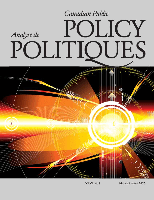
CANADIAN PUBLIC POLICY-ANALYSE DE POLITIQUES
Shaping tomorrow's policies through rigorous analysis.Canadian Public Policy - Analyse de politiques is a prominent academic journal published by University of Toronto Press Inc, dedicated to advancing the field of public policy through rigorous analysis and scholarly discourse. Since its inception in 1978, the journal has established itself as a vital resource for researchers and professionals alike, providing insights into the dynamics of public administration and sociopolitical issues in Canada and beyond. With an impressive impact factor and ranked in the Q1 quartile in both Public Administration and Sociology and Political Science categories, it is recognized for its exceptional quality and contribution to social science scholarship. The journal is indexed in Scopus, where it ranks in the top percentile for both its categories, showcasing its relevance and influence in contemporary policymaking discussions. Although it does not currently offer open access, it remains an essential tool for scholars seeking to engage with timely research and analyses that inform public policy decisions. The journal serves as a forum where academic rigor meets practical application, ensuring that new ideas foster informed practices within the realm of public policy.

Journal of Demographic Economics
Exploring the Nexus of Population and EconomyThe Journal of Demographic Economics, published by Cambridge University Press, stands as a leading interdisciplinary platform dedicated to the exploration and advancement of research in the intertwined fields of demography, economics, and geography. With an impact factor that reflects its esteemed position—ranking in the Q1 quartile for Demography (2023)—the journal fosters scholarly dialogue through high-quality articles that elucidate the complex interactions between population dynamics and economic trends. Operating under an open access model, the journal ensures that its findings are widely accessible, promoting inclusivity and engagement among researchers, professionals, and students alike. The Journal of Demographic Economics endeavors to bridge gaps in knowledge by publishing innovative and rigorous studies, thereby contributing significantly to both theoretical frameworks and practical applications across various domains. Drawing submissions from a global audience, this journal not only enhances the understanding of demographic transitions but also informs policy decisions and socioeconomic development strategies, making it an essential resource for those invested in demographic and economic research.
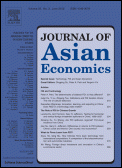
Journal of Asian Economics
Empowering Scholars and Practitioners in Asian EconomicsThe Journal of Asian Economics, published by Elsevier, serves as a pivotal platform for scholars and practitioners engaged in the comprehensive study of economic issues within Asia. With an ISSN of 1049-0078 and an E-ISSN of 1873-7927, this esteemed journal encompasses a wide array of topics in its scope, ranging from macroeconomic policy analysis to the intricacies of financial markets in the Asian context. Ranking in the Q2 category for both Economics and Econometrics and Finance, according to the 2023 metrics, it is positioned among the top-tier journals, currently holding a significant place at the 73rd percentile in Finance and 72nd percentile in Economics. This journal not only caters to academic researchers looking to publish their findings but also serves as an essential resource for professionals and students seeking to deepen their understanding of the dynamic economic landscape in Asia. By bridging empirical research and practical insights, the Journal of Asian Economics plays a crucial role in advancing knowledge and encouraging discourse in the field.
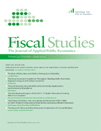
FISCAL STUDIES
Illuminating the complexities of fiscal policy.FISCAL STUDIES, published by WILEY, is a prestigious journal focused on the intricate dynamics of finance, economics, and accounting. With a history of excellence dating back to 1979, this journal has established itself as a leading publication, boasting an impressive impact factor and ranking in the top quartile across multiple categories: Q1 in Accounting, Q1 in Economics and Econometrics, and Q1 in Finance for 2023. As evidenced by its Scopus rankings—3rd in Accounting, 9th in Finance, and 23rd in Economics—this journal is an invaluable resource for researchers, professionals, and students pursuing in-depth knowledge in these fields. While it currently does not offer open access options, its comprehensive editorial scope ensures rigorous peer-reviewed articles that contribute significantly to fiscal discourse and policy development. Engage with FISCAL STUDIES to explore groundbreaking research and advancements in understanding financial systems and economic strategies.